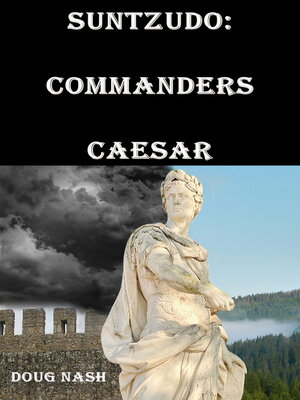
Sign up to save your library
With an OverDrive account, you can save your favorite libraries for at-a-glance information about availability. Find out more about OverDrive accounts.
Find this title in Libby, the library reading app by OverDrive.



Search for a digital library with this title
Title found at these libraries:
| Loading... |
Julius Caesar, a prominent Roman figure, and Sun Tzu, a distinguished Chinese general and philosopher, though separated by distinct cultures and eras, surprisingly shared noteworthy commonalities in their roles as leaders and strategic thinkers. Caesar, a Roman citizen, ascended to the rank of general and eventually the esteemed political office of Pontifex Maximus, demonstrating his multifaceted influence in Roman politics, military, and religious spheres. Similarly, Sun Tzu, a Chinese military strategist, served as a general and left a lasting impact as an author and philosopher, contributing significantly to understanding strategic principles in warfare and conflict. The common ground extends beyond their official roles.
Despite the geographical and cultural differences separating them, Julius Caesar and Sun Tzu shared a profound commonality in leadership, a deep understanding of strategic principles, and a pragmatic approach to the complexities of their respective roles. These commonalities underscore the universal nature of effective leadership and strategic thinking, transcending cultural and historical boundaries.
1. Strategic Vision: Caesar and Sun Tzu were remarkably able to imagine, create, and execute complex military strategies. They understood the importance of careful planning, adaptability, and the need to account for various factors in achieving success on the battlefield.
2. Emphasis on Knowledge and Understanding: Both leaders emphasised the importance of knowing oneself, the adversary, and the environment as the first step to understanding how to defeat them with strategy and not fighting. Caesar's famous quote, "Veni, Vidi, Vici" ("I came, I saw, I conquered"), highlights the value he placed on perceptive assessment and knowledge. Similarly, Sun Tzu's emphasis on understanding the terrain and the enemy's disposition emphasises the significance of comprehensive knowledge and understanding.
3. Psychological Warfare: Caesar and Sun Tzu recognised the power of psychological warfare. They understood how fear, deception, and morale could significantly impact the outcome of a conflict. Sun Tzu's teachings, in particular, delve deeply into the psychological aspects of warfare and the manipulation of an adversary's mindset.
4. Focus on Avoiding Unnecessary Conflict: Both leaders recognised the value of avoiding unnecessary conflict. Caesar's preference for diplomacy when possible and Sun Tzu's emphasis on winning without fighting highlight their shared belief that preserving resources and lives should always be the first step towards resolving a conflict.
Julius Caesar and Sun Tzu are remarkable figures in military history. Each contributes uniquely to the understanding of warfare, strategy, and leadership. Both are geniuses in conflict management. Even with Caesar's incredible success extensively documented, the intricacies of his strategic thinking pose a challenge to unravel. Sun Tzu's preciseness and conciseness present a cerebral challenge, often perceived as too intellectual for practical application. Together, however, they form a dynamic duo. Caesar's captivating real-life actions find explanation and depth through the maxims of Sun Tzu. The brilliance of Sun Tzu's theoretical treatise gains practicality and life through Caesar's military prowess. This synergistic relationship between the Roman general and the Chinese philosopher enriches our understanding of strategic thinking. Combining the real-life actions of Julius Caesar and the insights of Sun Tzu offers profound wisdom into warfare and further into the broader intricacies of conflict management and...






